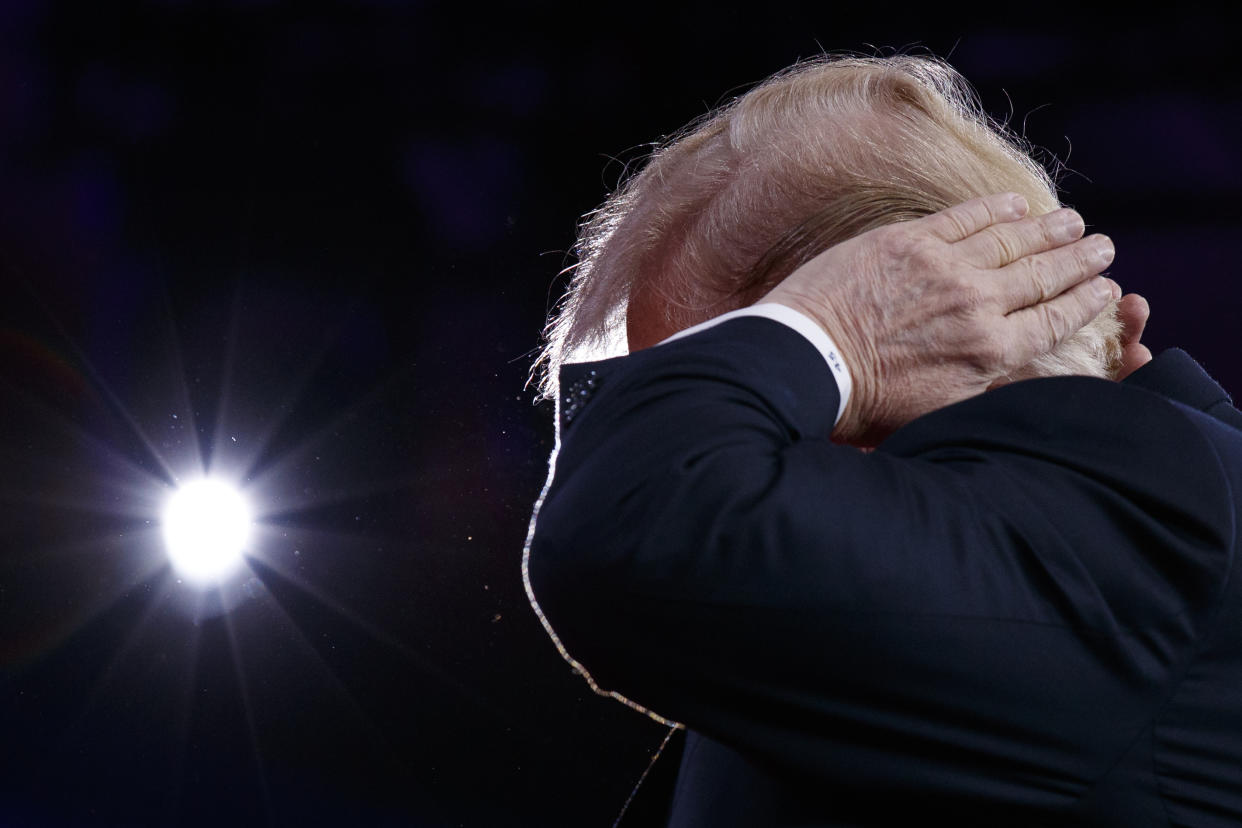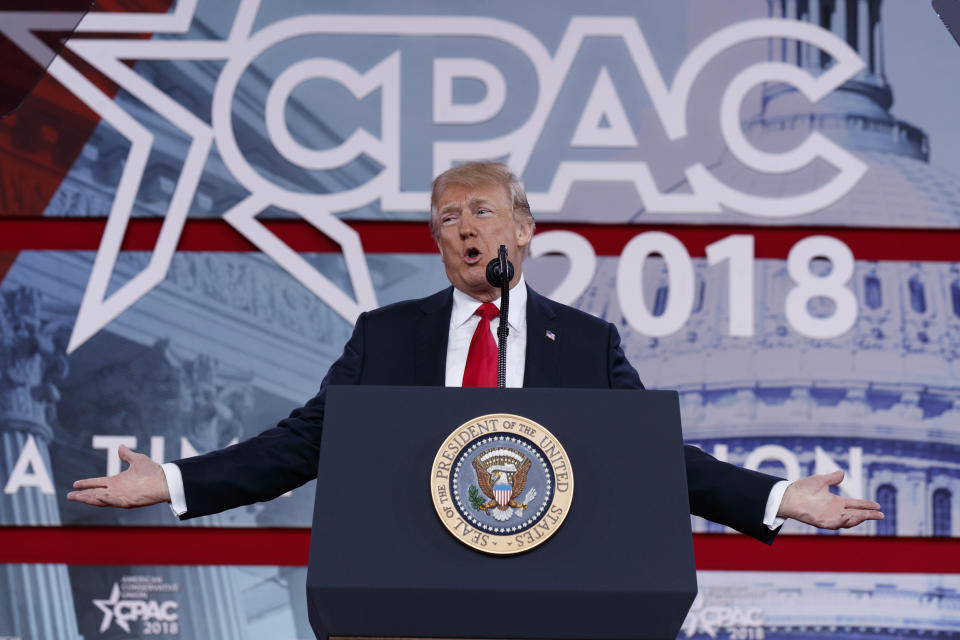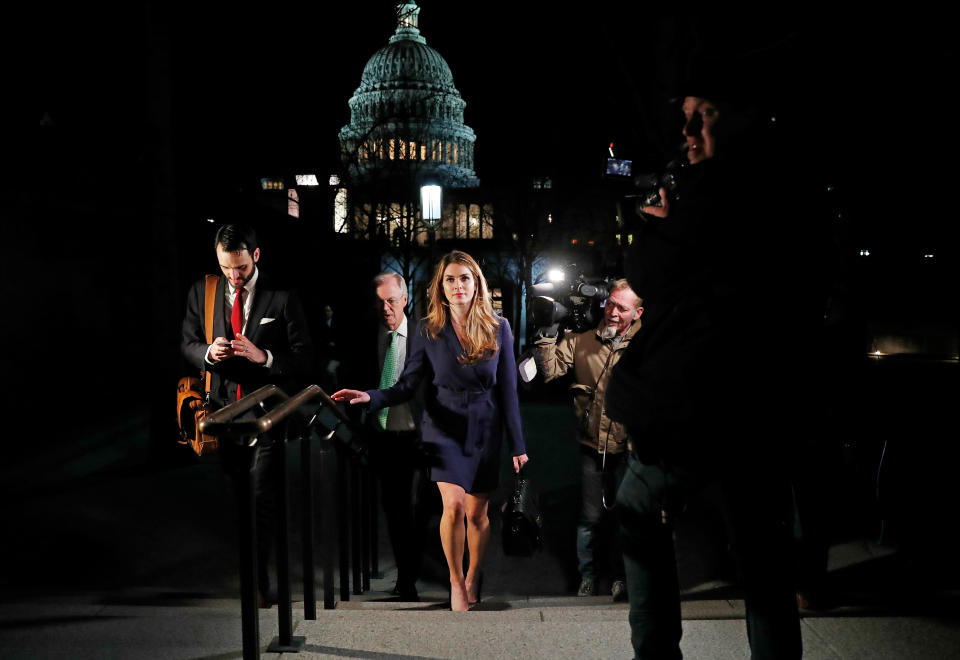Seven days in Trumpland: Confusion, scandals and indictments

For President Trump, it has been a week to forget.
Even by the standards of a White House beset by multiple investigations, routine allegations of ethical lapses and an agenda that, in and of itself, keeps news organizations struggling to keep pace, the seven-day span from Friday, Feb. 23, through Friday, March 2, stands out.
Friday, Feb. 23
In a speech to the Conservative Political Action Conference (CPAC), Trump announced new U.S. sanctions against North Korea, and said that if those don’t work, “we’ll have to go ‘phase 2’ and phase 2 may be a very rough thing, may be very, very unfortunate for the world. But, hopefully, the sanctions will work.”
As the nation continued to grieve for the victims of the Parkland, Fla., high school massacre, Trump reiterated his view that arming teachers would deter shooters, despite news reports confirming that a uniformed sheriff’s deputy on duty at Marjory Stoneman Douglas High School failed to take action against the shooter.

“A teacher would have shot the hell out of him before he knew what happened,” Trump said at CPAC.
But Friday’s real bombshell came from special counsel Robert Mueller, who obtained a guilty plea from former Trump aide Rick Gates as part of a deal that ratchets up pressure on former Trump campaign manager Paul Manafort. The cooperation of Manafort, who has been indicted on a variety of bank, tax and conspiracy charges but maintains his innocence, is considered key to Mueller’s investigation into ties between the campaign and the Russian government.
Saturday, Feb. 24
The House Intelligence Committee released a redacted Democratic memo that rebutted claims made in an earlier Republican memo of FBI surveillance abuses during the campaign.
“The Democratic response memo released today should put to rest any concerns that the American people might have as to the conduct of the FBI, the Justice Department and the FISC,” Rep. Adam Schiff, D-Calif., said in a statement.
Indeed, the new memo undercut several of the claims made in the GOP version, including the most significant: that a FISA court granted a warrant to surveil former Trump campaign foreign policy adviser Carter Page based on the so-called Steele dossier.
With the memo dominating headlines, Trump headed for a safe harbor: An interview with Fox News’ Jeanine Pirro, during which he lashed out at Schiff, calling him a “total phony” and a “bad guy,” and then blamed his own Attorney General Jeff Sessions for not investigating the Democrats on the committee.
President @realDonaldTrump on Dem FISA memo: "A lot of bad things happened on the other side, not on this side, but the other side. And somebody should look into it because what they did was really fraudulent." pic.twitter.com/PgEyKLAYEM
— Fox News (@FoxNews) February 25, 2018
Monday, Feb. 26
During a meeting with many of the nation’s governors at the White House on how to make schools safer from mass shootings, Trump made news with the announcement that he had secretly met with National Rifle Association leaders Wayne LaPierre and Chris Cox over the weekend. The president then summed up his get-together with the NRA officials:
“Don’t worry about the NRA, they’re on our side,” Trump said. “Half of you are so afraid of the NRA, there’s nothing to be afraid of.”
During that same meeting, Trump raised eyebrows when imagining how he would have responded to the shooting at Marjory Stoneman Douglas High School.
“I really believe I’d run in there, even if I didn’t have a weapon,” Trump said. “I think most of the people in this room would’ve done that too. Because I know most of you. But the way they [the sheriff’s deputies who failed to confront the shooter] performed was really a disgrace.”
Tuesday, Feb. 27
With critics blasting his statements on the Parkland school shooting, another long-simmering potential conflict came to full boil: the status of Jared Kushner’s security clearance, which reportedly was downgraded from “Top Secret” to “Secret” — a virtually useless designation for a top presidential aide — as part of chief of staff John Kelly’s housecleaning of White House staffers who had not cleared their FBI background checks.
The New York Times also reported that Trump’s Department of Housing and Urban Development secretary, Ben Carson, had purchased a dining room set for $31,000 using taxpayer funds.
Also Tuesday, White House communications director and Trump confidante Hope Hicks testified before the House Intelligence Committee that she had, on occasion, been required to tell white lies for the president. Hicks also followed a similar script to that of former White House chief strategist Steve Bannon in citing executive privilege when asked questions about the transition period between Trump’s election and inauguration.

Wednesday, Feb. 28
A mid-September trial date was set for Manafort, meaning that his high-stakes case will officially overlap with the final months of the 2018 midterm elections. The judge also reprimanded Manafort for violating a gag order and speaking about the charges against him publicly. With the investigation gaining steam and Mueller having secured the cooperation of a third aide to Trump’s presidential campaign, the president again took to Twitter to vent his frustrations with Sessions.
Why is A.G. Jeff Sessions asking the Inspector General to investigate potentially massive FISA abuse. Will take forever, has no prosecutorial power and already late with reports on Comey etc. Isn’t the I.G. an Obama guy? Why not use Justice Department lawyers? DISGRACEFUL!
— Donald J. Trump (@realDonaldTrump) February 28, 2018
The day’s biggest news, however, came at a White House meeting with Congress on the subject of making schools safer. Again and again, Trump confounded lawmakers by appearing to embrace Democratic positions on background checks and raising the legal age for purchasing some weapons. He went so far as to recommend seizing guns from people suspected of dangerous tendencies without a court order — a prima facie violation of the Fourth Amendment that drew the wrath of Trump’s staunchest supporters.
Late Wednesday, the White House suffered another blow, when Hicks surprised political observers in announcing she was stepping down from her role as communications director. Hicks, who was considered one of Trump’s closest confidants, was the fourth person to hold that job since the administration took office.
Thursday, March 1
In a relatively minor Trump administration scandal, EPA head Scott Pruitt announced that he would no longer fly first class on government business. Like Carson’s lavish furniture purchase, Pruitt’s travel budget had come under fire, furthering the perception that the president had not drained the Washington swamp.
Meanwhile, Trump continued to sow confusion about his position on gun control, holding a second meeting with the NRA in a week. Officials of the organization hastened to assure its members that the president did not really believe what he had clearly stated the day before.
I had a great meeting tonight with @realDonaldTrump & @VP. We all want safe schools, mental health reform and to keep guns away from dangerous people. POTUS & VPOTUS support the Second Amendment, support strong due process and don’t want gun control. #NRA #MAGA
— Chris Cox (@ChrisCoxNRA) March 2, 2018
Trump himself avoided specific legislative commitments.
Good (Great) meeting in the Oval Office tonight with the NRA!
— Donald J. Trump (@realDonaldTrump) March 2, 2018
Reportedly “unglued” over the flood of negative headlines in recent days, Trump abruptly called a meeting to announce Thursday that he was imposing tariffs on steel and aluminum, catching members of his own administration off-guard. The stock market sagged and many Republicans were nonplussed at the news. Perhaps no rebuke was stronger than that issued by the Wall Street Journal, whose lead editorial began, “Donald Trump made the biggest policy blunder of his Presidency Thursday by announcing that next week he’ll impose tariffs of 25% on imported steel and 10% on aluminum.”

Friday, March 2
The president further alarmed Republicans and Democrats alike Friday with tweets that seemed to bespeak a deep misunderstanding of trade deficits and economic policy.
When a country (USA) is losing many billions of dollars on trade with virtually every country it does business with, trade wars are good, and easy to win. Example, when we are down $100 billion with a certain country and they get cute, don’t trade anymore-we win big. It’s easy!
— Donald J. Trump (@realDonaldTrump) March 2, 2018
We must protect our country and our workers. Our steel industry is in bad shape. IF YOU DON’T HAVE STEEL, YOU DON’T HAVE A COUNTRY!
— Donald J. Trump (@realDonaldTrump) March 2, 2018
As predicted, the European Union announced that it would impose retaliatory tariffs on U.S. goods, such as Harley-Davidson motorcycles, Levi’s blue jeans and bourbon whiskey in response to Trump’s steel and aluminum tariffs. In total, the EU tariffs could total $3.5 billion should the president not change his mind.
Read more from Yahoo News:



